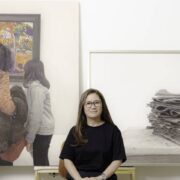Insights and discoveries from a screenwriting workshop

As a film teacher, one of the things I say a lot in class is that you don’t actually have to study film in college to become a filmmaker. That usually gets a big reaction from the students. If you want to be a filmmaker, just watch a lot of movies and just start making them. A lot of the great filmmakers never actually studied film in college. Lino Brocka and Ishmael Bernal took up English Literature. Mike De Leon graduated with a Humanities degree.
So why take up film if you don’t need to graduate in it to become a filmmaker? Because film school gives you access to a larger network that is key to becoming a filmmaker in this day and age. The industry is small and competitive so finding work requires people to vouch for you and people to bring you into productions. In film school, you get to practice your craft with a faculty that can evaluate your work based on their experience in film, which gives you a head start in refining your technique and helping you find your artistic voice.
Outside of film school, there are workshops all over the country that serve the same purpose. As a member of the Filipino Screenwriters Guild (FSG), I’ve been lucky to have been part of a partnership with the Film Development Council of the Philippines (FDCP) in providing basic screenwriting workshops for the writing of short film screenplays since last year. In 2024, we held a five-day workshop over five weeks in Manila, and a three-day intensive workshop in Iloilo, Bacolod, and Davao City. This year, we had a five-day intensive workshop in Bulacan, co-sponsored by the Bulacan city government through the Provincial History Arts and Cultural Office in Malolos City.
20 participants—10 from Bulacan, one from Iloilo City, one from Davao City, and the rest from Manila—and all from different walks of life. We had three who already had experience making films, several of them film students, and others submitting their first-ever written works. The screening committee ensured that it would be a good mix of people so that different perspectives could be heard from people of different backgrounds. It meant a stronger synergy of ideas and a dynamic feedback process that allowed each script to find its strengths and weaknesses. The four mentors from the FSG—writer, director, and producer Jules Katanyag; writer and director Paul Sta. Ana; writer and Palanca winner Noreen Capili; and myself—shared our own experiences and specific expertise to ensure that each screenplay would find areas to improve and grow.
Outside of the workshop, the 20 participants bonded and formed a tight kinship that would support each other through their film journey. Other than meeting and getting feedback from industry practitioners, they found a group who would be there to read their future scripts, inform them of other opportunities, and who would encourage each other to keep writing.
These are some of my learnings from this workshop.
Don’t wait until you have a perfect draft. Just send what you’ve got
A few of the applicants were shocked that they got in as some of them heard about the workshop a few days before the deadline. Some even admitted to writing their scripts just four hours before the deadline. They still got chosen. Someone even sent in a documentary pitch and one of the screening committee members liked it so much and fought for it. So we gave feedback to the material on how best to proceed with the documentary and as someone who had written documentaries, I also gave tips and pointers on how to draft the pre-shooting script.
When applying for grants, applications for workshops, and joining film festivals, don’t wait for permission or for the “perfect draft.” Just send it. The worst that could happen is that you get rejected.
Write about what is personal and authentic to your voice
Many of the screenplays from Bulacan paint a picture of a city (Malolos) and a province on the cusp of change. Due to the building of the airport, the Skyway, and a train project, the city is undergoing massive changes, and the city and province that the writers used to know is disappearing. A lot of their stories are about reconciling the changing urban landscape of their hometown, striking a chord with the other workshop fellows and the mentors because the works had so much heart. Several scripts had the same theme but showed different perspectives and points of view. We don’t get to see these stories at all in our festivals so I really do hope that they find a way to produce them and send them out.
Genre films are prevalent and world-building is a necessary step in scriptwriting
There were quite a few films among the scripts that fell into the categories of either fantasy or horror. There were one or two movies that fell under the category of love, but not necessarily romance. I liked reading the genre films because it touches upon our Filipino identity and our penchant for the whimsical and the fantastical. But what those stories needed was to create the world of their film in a way that detailed for the audience what the rules of that film’s reality are. Even some of the realist films needed a bit more grounding. The lecture by Paul Sta. Ana on the importance of research in any scriptwriting endeavor was so vital for this batch, and if we are lucky to continue our partnership with FDCP, this will be a staple for every workshop that we do moving forward.
We have not yet run out of queer stories to tell
There was a good number of queer stories in the mix and some of them were stories I have not yet encountered before. There’s still so much queer narratives that have yet to be explored and new ways of framing their experiences to highlight their struggles and joys in ways that could be understood by people outside of the community.

















